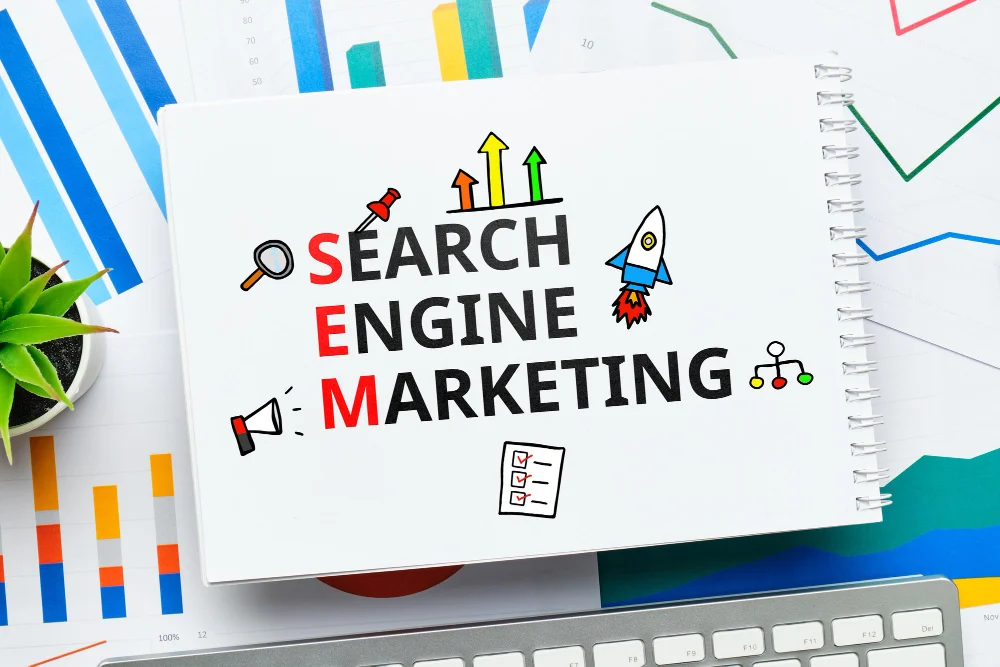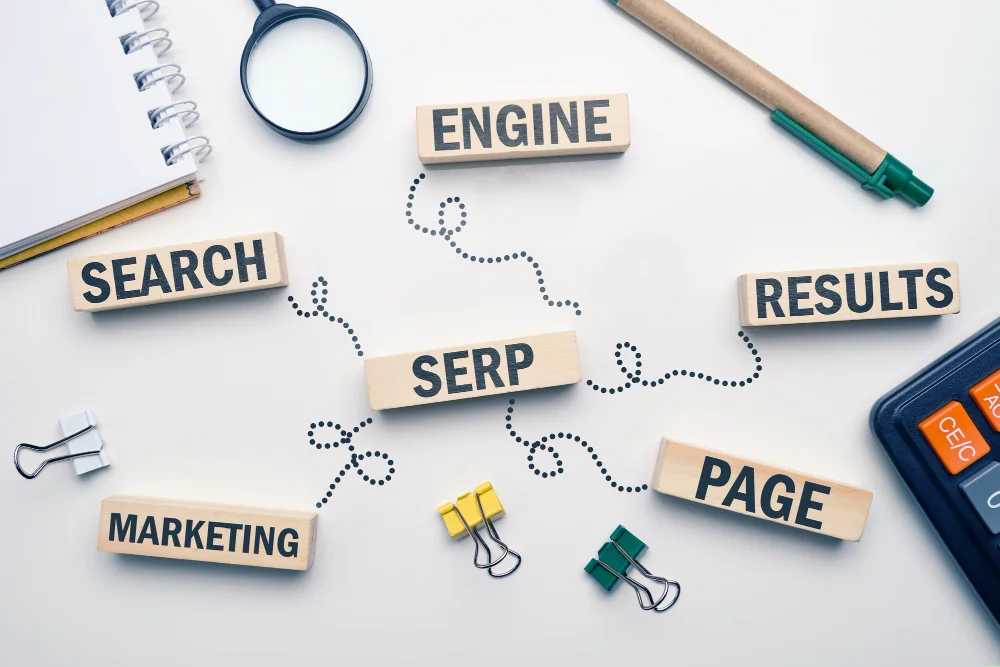What is Search Engine Marketing?
With the rapid increase in the importance of Search Engine Marketing, it has become essential for businesses to understand the concept and the process to get the desired results. Search engine marketing (SEM) services refer to the various strategies and techniques used to promote businesses, products, and services online through search engines. SEM typically involves using paid search ads, such as pay-per-click (PPC) advertising, and optimizing a website’s content and structure to improve its visibility in organic search results.

Search engine marketing can also be called what is known as Paid Marketing. It typically includes keyword research, ad creation, bid management, and optimization to drive targeted traffic to a website. SEM services can be highly customized to fit individual businesses’ unique needs and goals. Before dwelling on the importance of search engine marketing, these are a few services offered by SEM agencies.
Some standard services offered by SEM agencies:
Search engine marketing (SEM) encompasses various services and strategies to promote websites and increase their visibility in search engine results pages. These services will help you understand the importance of Search Engine Marketing and the ones suitable for your business.

-
- Pay-Per-Click (PPC) Advertising: PPC advertising includes creating and managing paid search campaigns on platforms like Google Ads, Bing Ads, and other search engine advertising networks. Advertisers bid on keywords relevant to their target audience and pay when users click on their ads.
-
- Keyword Research: Identifying relevant and high-performing keywords that align with the advertiser’s business goals. It involves researching search volumes, competition, and user intent to optimize campaign targeting.
-
- Ad Creation and Copywriting: Crafting compelling and engaging ad copies that entice users to click and visit the website. Advertisers create relevant headlines, descriptions, and call-to-action (CTA) to drive conversions.
-
- Landing Page Optimization: Optimizing the landing pages where users are directed after clicking an ad. This involves improving the page layout, design, content, and user experience to increase conversion rates.
-
- Bid Management and Optimization: Monitoring and adjusting keyword bids to maximize ad campaign return on investment (ROI). This includes changing bids based on performance, competition, and budget considerations.
-
- Ad Extensions: Enhancing ads with additional information or features, such as site links, call extensions, location extensions, and structured snippets. Ad extensions provide more visibility and improve overall ad performance.
-
- Performance Tracking and Analytics: It can be achieved by using tracking tools and analytics to measure and analyze the performance of SEM campaigns. This includes tracking impressions, clicks, conversions, and other key metrics to assess campaign effectiveness.
-
- Remarketing: Reaching out to users who have previously interacted with the website or shown interest in specific products or services. Remarketing allows advertisers to reconnect with potential customers and encourage them to revisit and convert.
-
- Ad Testing and Optimization: By conducting A/B testing and optimizing ad elements, such as headlines, descriptions, images, and landing pages, we can improve campaign performance, click-through rates (CTRs), and conversions.
-
- Campaign Reporting: Providing regular reports and insights on campaign performance, including critical metrics, conversions, costs, and ROI. This helps advertisers track progress, make data-driven decisions, and refine their SEM strategies.
These services help businesses increase their online visibility, drive targeted traffic, and achieve their marketing goals through effective search engine marketing campaigns.
CrimsonCobalt Digital offers comprehensive search engine marketing (SEM) services to help businesses enhance their online presence and achieve their marketing goals. Contact us for more details and follow our Facebook profile for latest updates.
Types of Search Engine Marketing
Before going through the importance of Search Engine Marketing in detail, it is of paramount importance to understand the types of SEM. There are two important categories of Search Engine Marketing (SEM):
Search Engine Advertising:
This type of SEM involves creating and running paid advertising campaigns on search engines. The most commonly used form of search engine advertising is pay-per-click (PPC) advertising, where advertisers bid on keywords and pay when their ads are clicked. Understanding the importance of search engine marketing allows businesses to display their ads prominently on search engine results pages (SERPs) when users search for specific keywords or phrases. Google Ads and Bing Ads are popular platforms for search engine advertising.
Search Engine Optimization (SEO):
It is another aspect of SEM that focuses on improving organic search engine rankings. Unlike search engine advertising, SEO does not involve paid advertisements. Instead, it involves optimizing website content, structure, and other factors to improve its visibility and ranking in organic search results. SEO techniques include keyword research, on-page optimization, link building, technical optimization, and content creation to improve a website’s visibility and attract organic traffic. But the importance of search engine marketing will multiply if it is properly integrated with SEO.
Both search engine advertising and optimization are essential factors of a comprehensive search engine marketing strategy. Search engine advertising provides immediate visibility and control over ad placements, while search engine optimization helps achieve long-term organic rankings and drive sustainable website traffic. Combining both approaches can maximize a business’s online presence and reach a wider audience.
Importance of Search Engine Marketing:
Let us now look deeply into the importance of search engine marketing in your Digital Marketing campaigns.
-
- Cost-Effective Advertising: SEM offers cost-effective advertising options, such as pay-per-click (PPC) campaigns, where businesses only pay when their ads are clicked. This importance of search engine marketing allows for better control over advertising budgets and the ability to evaluate marketing efforts’ return on investment (ROI).
- Immediate Results: Unlike organic Search Engine Optimization (SEO), which takes time to generate results, SEM can deliver immediate visibility and traffic to a website. Businesses can quickly launch campaigns and start attracting potential customers to their sites.
- Improved Online Visibility: SEM allows businesses to appear prominently in search engine results, ensuring their products or services are visible to a broader audience. This enhanced visibility can lead to more website traffic and brand exposure.
- Targeted Advertising: SEM enables businesses to target specific keywords, demographics, locations, and other factors to ensure their ads are shown to a relevant audience. This targeted approach increases the chances of reaching probable customers.
- Measurable and Trackable Results: SEM provides detailed analytics and performance metrics that allow businesses to track the effectiveness of their campaigns. This data helps companies to understand customer behavior, measure the ROI of their marketing efforts, and implement data-driven decisions to optimize future campaigns. The importance of search engine marketing has no substitute, as tracking the events occurring in your campaign is necessary.
- Competitive Advantage: In a highly competitive online landscape, SEM can give businesses a competitive edge by ensuring their ads appear above organic search results and their brand stands out to potential customers. It allows firms to outperform competitors and attract more customers to their websites.
The importance of Search Engine Marketing needs to be understood before opting for its services as it will help in getting a better picture of its effects and the best practices to be followed to get the maximum benefits of SEM.
Examples of Search Engine Marketing

After studying the importance of search engine marketing, here are some search engine marketing examples and techniques that can be practiced:
-
- Pay-Per-Click (PPC) Advertising: Running paid ads on search engines like Google Ads or Bing Ads, where advertisers bid on keywords and pay when their ads are clicked.
- Search Engine Optimization (SEO): Optimizing website content, structure, and other factors to improve organic search engine rankings and increase visibility in search results.
- Display Advertising: Placing visual banner ads on websites that are part of an advertising network to reach a targeted audience.
- Remarketing: Displaying ads to users who have previously visited your website, encouraging them to return and complete a desired action.
- Shopping Ads: Creating product listings and ads that appear in search engine results, showcasing specific products and their prices.
- Local Search Marketing: Optimizing online presence and listings for local businesses to increase visibility in local search results and attract nearby customers.
- Mobile Advertising: Creating and running ads specifically designed for mobile devices, targeting users accessing search engines through smartphones or tablets.
- Video Advertising: Running ads in video format on platforms like YouTube or other video-sharing websites to reach a targeted audience.
- Social Media Advertising: Running advertisements on social media platforms like Facebook, Instagram, or Twitter to reach specific demographics and engage with users.
- Conversion Rate Optimization (CRO): Analyzing and optimizing website elements and user experiences to improve the conversion rate of visitors into customers or leads.
These are some examples containing the importance of Search Engine Marketing. The field of SEM is diverse and constantly evolving as new technologies and platforms emerge. Businesses often employ a combination of these techniques to reach their target audience effectively.
Advantages and Disadvantages of Search Engine Marketing:
Advantages of Search Engine Marketing:
-
- Immediate Results: With paid search ads, businesses can achieve instant visibility and drive traffic to their website, unlike organic search methods, which may take time to generate results. Due to the immediate result that it offers, the importance of search engine marketing has grown rapidly for the last decade.
- Improved Visibility: SEM allows businesses to appear prominently in search engine results, increasing their visibility and exposure to potential customers.
- Targeted Advertising: SEM enables precise targeting based on keywords, demographics, location, and other factors, ensuring that ads reach a relevant audience likely to be interested in the product or service.
- Cost Control: SEM platforms typically offer various budgeting options, allowing businesses to set daily or campaign limits to control their advertising spend.
- Measurable Results: SEM provides detailed performance metrics, enabling businesses to track the efficiency of their campaigns, measure return on investment (ROI), and make data-driven optimizations. These advantages will enhance the importance of Search Engine Marketing campaigns.
Disadvantages of SEM:
Along with the importance of Search Engine Marketing and its advantages, it is necessary to understand its shortcomings as well in order to make sure that you don’t rely only on SEM for your digital marketing.
-
- Learning Curve: Mastering SEM techniques and optimizing campaigns require knowledge and expertise. Without proper understanding and strategy, businesses may not maximize the potential benefits and could waste advertising budgets.
- Cost: Running paid search ads can be costly, particularly for competitive keywords, and businesses must carefully manage their budget to achieve a positive ROI.
- Click Fraud: Click fraud is a potential risk in SEM, where malicious actors or automated bots click on ads to deplete budgets without genuine user engagement. Ad platforms have measures to counter click fraud, but it remains a concern.
- Ad Blindness: Users may develop ad blindness, consciously or subconsciously ignoring paid search ads, mainly if they appear too frequently or are irrelevant to their search intent.
- Dependency on Platforms: SEM relies on search engine platforms, and changes in algorithms, policies, or bidding systems can impact campaign performance and results.
It’s essential for businesses to carefully evaluate the importance of search engine marketing as well as its advantages and disadvantages and consider their specific goals, target audience, and budget before implementing a search engine marketing strategy. A clear idea of the search engine marketing advantages and disadvantages will help in choosing the right strategy for your business.
Overall, the importance of search engine marketing is increasing exponentially as it helps businesses increase their online visibility, target relevant audiences, drive website traffic, measure campaign effectiveness, and achieve their marketing objectives cost-effectively and measurably. Hence, businesses must understand the importance of Search Engine Marketing and its pros and cons to reap its amazing benefits.

